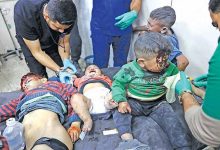Toxic Metals in War Zones Threaten Infant Development and Breastfeeding, Study Finds.
Research links exposure to carcinogenic metals from modern weaponry to severe developmental and cognitive delays in children born during wartime, with evidence from a Gaza-based study.

Watan-A recent psychological study published in the second half of April this year in the journal Infant Behavior and Development reveals that high levels of toxic metals in war zones are closely linked to increased birth defects and growth, psychological, and cognitive problems in fetuses during pregnancy and after birth through breastfeeding.
Toxic and Carcinogenic Metals Threatening Mothers’ Health
Breastfeeding is known to be a crucial form of organic protection for newborns, aiding their physical, psychological, and cognitive development. However, in war zones, toxic metals released into the air from modern weapons pose significant risks to the health of both mothers and infants, making it vital to monitor their impact.
Researchers from Tampere University in Finland explained that the technological advancement in conventional weaponry has led to increased levels of toxic and carcinogenic metals in the atmosphere, negatively affecting children’s development.

Study on 500 Palestinian Mothers and Their Infants
The study, which involved more than 500 Palestinian mothers and their infants, was conducted in three phases: the first in maternity hospitals in northern, central, and southern Gaza between January and March 2014; the second when the infants reached six months; and the third after 18 months, during which researchers conducted home interviews with mothers.
Researchers assessed the children’s development, asking mothers about their infants’ fine motor skills, language development, and social-emotional growth. Participants were selected based on being in their first trimester during the 2014 Gaza War.
Dangers to the Nervous System
The study focused on the impact of specific metals known to cause cancer, harm the nervous system, and impede fetal development, such as tungsten, uranium, mercury, and chromium. Concentrations of these metals were measured from hair samples of mothers and newborns.
Metal Samples from Mothers and Infants’ Hair
In previous studies, researchers examined specific toxic metals like white phosphorus and enriched uranium linked to pregnancy complications or neonatal health. This new study tested 18 toxic metals using hair samples collected at birth, highlighting the critical role of breastfeeding in war-traumatized families.
Findings showed that elevated levels of carcinogenic and neurotoxic metals—such as arsenic, lead, mercury, and manganese, particularly harmful to the brain and central nervous system—were associated with overall developmental delays, reduced breastfeeding ability, and shorter breastfeeding durations, thus compounding the negative impacts on infants.

Deterioration in Children’s Sensory and Cognitive Skills
High toxic metal levels in mothers and newborns were clearly associated with developmental problems at 6 and 18 months, including motor-sensory and cognitive impairments, emotional interaction dysfunction, and delayed language development.
Ultimately, the study confirmed that toxic metals from weapons and bombs can disrupt ideal breastfeeding (a key natural protective function during childhood), showing that the devastating effects of war extend beyond immediate victims, impacting future generations by depriving them of proper nutrition and a healthy environment.






